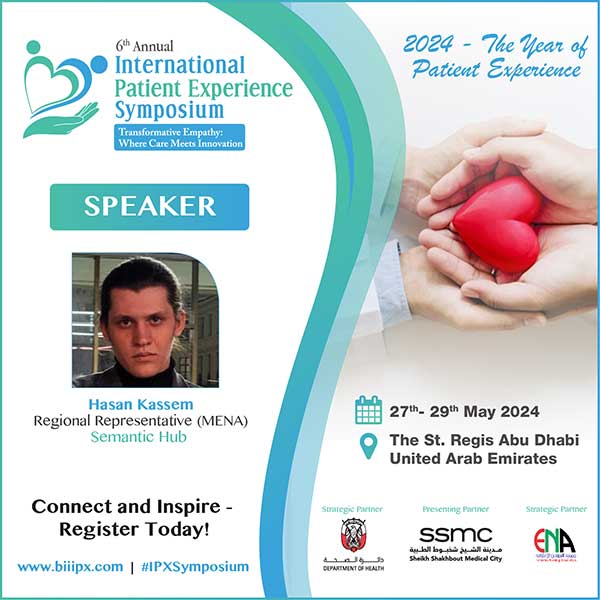1. How do you perceive the significance of 2024 as “The Year of Patient Experience,” and what key developments do you foresee in the realm of patient-centered care?
At Semantic Hub, a company built on the foundation of “patient voice,” we’re thrilled about 2024 being designated as the year of patient experience. This long-overdue focus perfectly aligns with the rising tide of patient-centric care. Patients are no longer passive participants in their healthcare journey. They’re evolving into active, informed, and empowered stakeholders throughout healthcare. It is expected that more and more companies will understand that by leveraging technology and data, particularly real-world evidence gleaned directly from patients, we can co-create a future of healthcare that is not only efficient but also built on a foundation of patient-centricity which empowers healthcare providers to truly fulfill their mission of delivering the best possible care.
While it’s true that patient experience (PX) is gaining traction, with giants like the FDA recognizing its importance as Real-World Evidence (RWE), continued focus is crucial. This symposium serves as a powerful platform to amplify the voice of patients and ensure that patient-centric care becomes the norm, not the exception.
2. As we delve into the theme “The Winning Formula: AI + Patient Experience = Healthcare‘s Revolutionary Future” how do you envision the combination of AI and patient voice driving innovation in healthcare practices to enhance the healthcare experiences?
The theme perfectly captures the exciting potential of this combo. At Semantic Hub, we believe AI can be a powerful tool to amplify patient voices. Imagine a powerful AI analyzing vast amounts of patient discussions online to uncover hidden patterns and trends in their experiences. This can inform everything from treatment launches to hospital design. I’ll be diving deeper into these specific innovations and how they’ll enhance healthcare experiences during my speech.
3. Beyond traditional clinical data, what other types of patient data do you see AI unlocking valuable insights from? How can these insights be used to personalize and optimize patient journeys, ultimately leading to better outcomes?
At Semantic Hub, we believe AI’s potential goes beyond analyzing traditional clinical data. Imagine AI analyzing data like wearable device metrics to understand a patient’s sleep patterns or activity levels. Social media posts, with appropriate privacy measures, reveal a 360-degree view of the patient.
Imagine a pharmaceutical company receiving an AI-powered report revealing a specific region where patients are struggling to get diagnosed due to specific bottlenecks as seen by patients. This allows for targeted interventions that lead to improved patient access and better healthcare outcomes.
4. At Semantic Hub, you champion the power of AI combined with patient voice. What obstacles do you see hindering healthcare providers from fully integrating the patient voice into their practices, and how can AI technology be strategically leveraged to overcome these barriers and ultimately enhance patient-centered care?
At Semantic Hub, we live and breathe patient voices. They’re the foundation of good healthcare, and frankly, the future of it. But let’s be honest, doctors are drowning in data. Surveys pile up, and sifting through social media posts feels like an impossible task. That’s where AI comes in as our secret weapon. Here’s the magic – AI powered by Natural Language Processing can analyze mountains of patient data, from surveys to online forums. It listens for the whispers, the shouts, the everything in between. This paints a complete picture. But it doesn’t stop there. Turning that voice into action can be tricky. AI helps us spot recurring themes and patterns. It’s like having a super-powered highlighter for the most important patient needs. This lets experts focus on what matters most – creating targeted solutions that truly make a difference. By breaking down these barriers, AI becomes a megaphone for the patient voice. It empowers doctors to deliver care that’s truly centered on the people it matters to most. This means better outcomes, happier patients, and a healthcare experience that feels more human for everyone.
5. In your opinion, how can interdisciplinary collaboration among healthcare professionals, technologists, and patient advocates foster a culture of empathy-driven innovation, ultimately shaping the future of patient care?
The true potential of innovation in healthcare is unlocked through collaboration. When healthcare professionals, technologists, and patient advocates work together, it creates a powerful environment for empathy-driven solutions. This diverse mix of expertise ensures cutting-edge advancements remain grounded in real-world patient needs and experiences. It’s this collaborative approach that holds the key to unlocking the future of patient care. I’m excited to delve deeper into this concept at the symposium and showcase how Semantic Hub contributes by using AI to amplify patient voices, giving them a stronger seat at the table.
6. How do you think participants will benefit by attending 6th Annual International Patient Experience Symposium?
Attendees at the symposium will walk away empowered. They’ll gain exclusive access to the latest advancements in patient experience (PX) strategies. This isn’t just theory – they’ll learn real-world applications and proven tactics that have demonstrably revolutionized patient journeys.
But the learning doesn’t stop there. The symposium fosters invaluable networking opportunities. Imagine connecting with leading PX professionals, researchers, and industry experts. This exchange of ideas and collaboration will accelerate progress in the field, propelling us closer to a future where healthcare is truly patient-centric.


